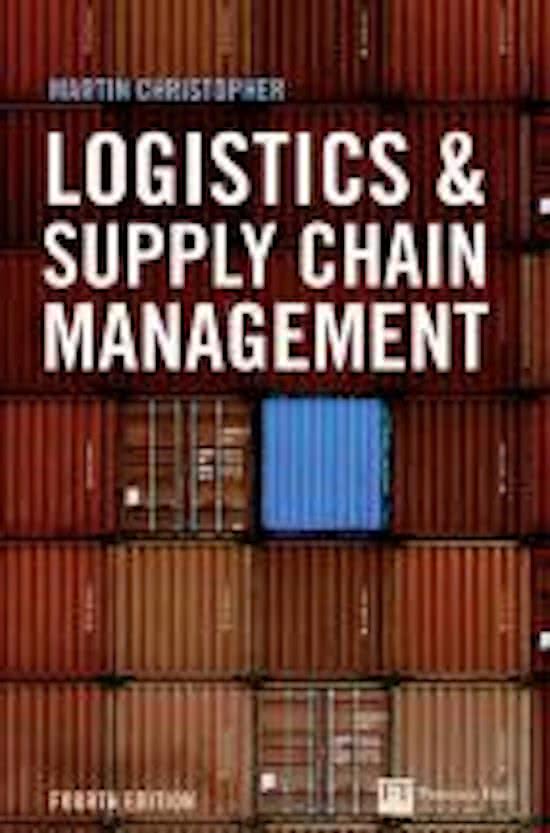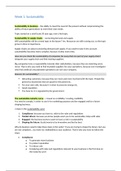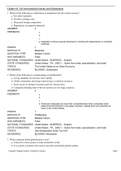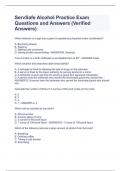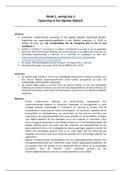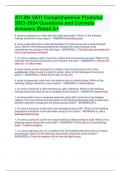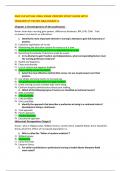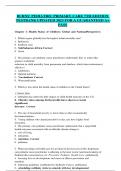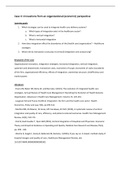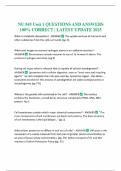Sustainability in business – the ability to meet the need of the present without compromising the
ability of future generatons to meet their own needs.
Topic started on a small scale 20 year ago, now a hot topic.
Sustainability in supply chains – connectng demand and supply.
Will sustainability stll be a trend topic in the future? Yes. Resources are stll running out, so the topic
grows in tme in importance.
Supply chains are about connectng demand and supply. If you need to take it into account,
sustainability becomes more complex, because it takes more tme.
How can you check the sustainability of companies far away that are part of your supply chain?
Integrate your supply chain and fnd trustng suppliers.
Big companies have a responsibility towards their stakeholders, because they are watching every
move. That is why you need to fnd trustable suppliers for your operatons, because one investgator
who fnd unethical unsustainable operatons can ruin your company.
Reasons for sustainability?
Attractng customers, because they are more and more involved with the topic. People like
green/eco businesses that are good for the planet etc.
For your own sake, because it is wiser to preserve energy etc.
Good reputaton
You have to, it is regulated by the government
The sustainable maturity curve --> based on credibility/ creatng credibility
You need to comply, in order to use it for marketng purposes and be engaged and be a future
shaping business.
4 steps in the sustainability curve
1. Compliance: because you have to, stck to the rules and regulatons
2. Market driven: because you know people want you to be sustainable, helps with sales
3. Engaged: the business starts to want to have a role in sustainability
4. Shaping the future: (tesla) wants to be innovatve and be the best
Why do business need to take these steps in this order? If you are trying to shape the future, but you
are not compliant… you have no creditability to your audience. That is why you have to follow the
steps.
Compliance
o To generate more business
o To protect reputaton
o To reduce cost
o Complying with rules and regulatons relevant to your business is the frst step on
the maturity curve
, Market-driven
o To reduce the impact on society/environment
o If customers are asking for more informaton on environmental and social issues,
you need to act upon that
Engaged
o Because we care
o Engaged business takes a more pro-actve approach, asking customers and suppliers
how they can help them achieve their sustainability goals
Shaping the future
o Companies looking to shape the future see sustainability issues as a way to become
leaders in their sectors
o drive future performance and gain a compettve advantage
Traditonal sustainability model - 3 P's:
People (social responsibility, once you commit people they will be more satsfed)
Planet (environmental stewardship)
Profit (economic growth)
Providing needs without compromising the future of the needs.
In Supply Chains sustainability is becoming more complex, because the world is becoming more
‘global’. You need more staf to check on it e.g. a logistcs supplier. You need to connect demand and
supply on a global base.
4 C’s (they split up the people part in the 3 P’s) ethics, educaton, environment, economic
Change from 3 P's to 4 E's
Economic (proft)
o Lean, locavore strategy (local eaten)
Environment (planet)
o Conservaton of the planet
Ethics (people, planet)
o Social responsibility, no child labour (Forever 21)
Educaton (people)
o Social responsibility, educaton local farmers (knorr)
Supply chain footprint design, source, make, deliver, return.
All parts and decisions have impact on the company’s footprint on the world.
Impact on supply chain decisions: e.g. the impact of the resource footprint.
Design
sustainable packaging
focus on opportunites to recycle and reuse
The physical characters of the product
Source


